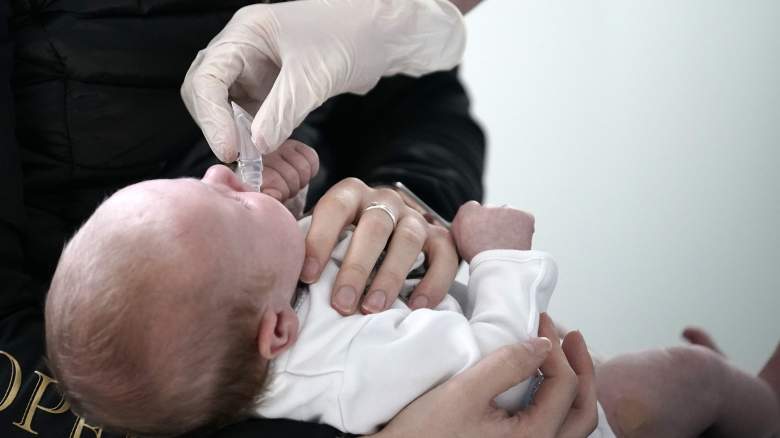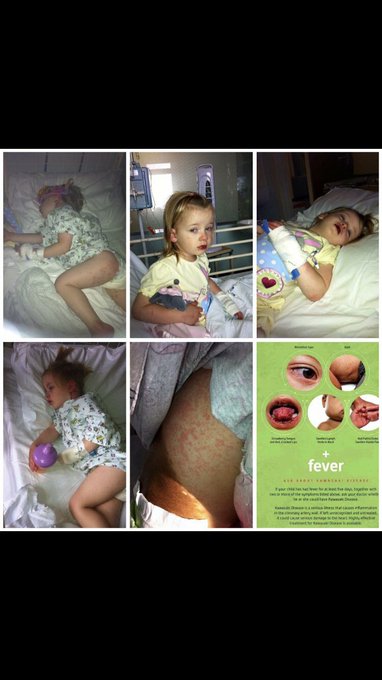
Getty A nurse gives a baby medicine after administering vaccines at St. Johns Medical Centre during the coronavirus lockdown in April 2020.
The National Health Service English was the first to report out a warning of the possible link between coronavirus in children and Kawasaki disease on Sunday. The Health Service Journal [HSJ] reported on Monday that over the past three weeks that “there has been an apparent rise in the number of children of all ages presenting with a multisystem inflammatory state requiring intensive care across London and also in other regions of the UK.”
Kawasaki syndrome is a disease that primarily affects children, causing swelling in the walls of medium-sized arteries throughout the body, according to the Mayo Clinic. Sometimes referred to as mucocutaneous lymph node syndrome, it can also cause swelling of the glands during infection of the lymph nodes, skin, and mucous membranes inside the mouth, nose, and throat.
While most reports of children infected with COVID-19 while also showing symptoms of Kawasaki disease were overseas in Italy, Spain, and Britain, according to Reuters as of April 28, there are three cases of children stateside being treated for the rare syndrome.
The kids affected are between the ages of six months and eight years old, and all three received treatment at Columbia Medical Center in New York. Dr. Mark Gorelik, a pediatric rheumatologist, and immunologist told Reuters, “Right now, we’re at the very beginning of trying to understand what that represents,” of the correlation between COVID-19 and Kawasaki disease.
However, Gorelick also noted that he believes these particular cases may not be Kawasaki syndrome, but an immune response triggered by an infection that has similar symptoms of the inflammatory disease. According to the Mayo Clinic, the causes of Kawasaki disease are unknown and the syndrome is not believed to be contagious. However, there are unproven theories linking the syndrome to certain environmental factors or genetics.
U.K.’s HSJ reported similar findings that while “there is a growing concern that [coronavirus]-related inflammatory syndrome is emerging in children in the U.K., there may be another, as yet unidentified, infectious pathogen associated with these cases.”
On April 27, the U.K.’s Pediatric Intensive Care Society [PICS] wrote in a statement letter:
It is important to highlight that, both in the U.K. and in other countries, there have still been very few cases of critically unwell children with COVID-19 admitted to pediatric intensive care units. However, an early case report relating to COVID-19 presenting as Kawasaki syndrome has been published recently [1], and PICS is aware of a small number of children nationally who appear to fit the clinical picture described in the NHS England alert.
What are the Signs & Symptoms of Kawasaki Disease?
Symptoms of the first phase of Kawasaki disease include high fever, sometimes higher than 102.2 degrees, that lasts more than three days. Another main symptom is eyes becoming extremely red and emitting a thick discharge. There may also be peeling of the skin.
Kawasaki disease can cause large rashes on the body, including the genital area, as well as cracked, red dry lips, mouth, and swollen tongue. There may also be swelling in the feet and hands.
In the second phase, a child may experience diarrhea, joint and abdominal pain, vomiting, and peeling on the skin coming off in large sheets. The third phase of Kawasaki disease is when the symptoms start to ease off unless further issues continue to develop. Symptoms can last for up to eight weeks before a child is back to normal health.
Those at highest risk of having Kawaski disease are children under the age of five, and of Asian or Pacific Island descent.
Doctors Urge Parents to Stay Calm Since the Risk to Children Remains Extremely Low
According to the American Academy of Pediatrics, Kawasaki disease has remained largely undetected stateside, and healthcare professionals urged parents to stay calm.
Professor Simon Kenny, NHS national clinical director for children and young people told CNN, “Thankfully Kawasaki-like diseases are very rare, as currently are serious complications in children related to Covid-19, but it is important that clinicians are made aware of any potential emerging links so that they are able to give children and young people the right care fast.”
Dr. Tina Tan, professor of pediatrics and infectious diseases at Northwestern University’s Feinberg School of Medicine said to CNN, “I think it’s really important that an alert like that goes out,” referring to the NHS England report, “not to alarm anybody but to have people be aware of the fact that this can happen. Here in the U.S., I think we’re just starting to see it.”
READ NEXT: WATCH: Did Trump Whisper ‘I Love Everybody’ at White House Briefing?


